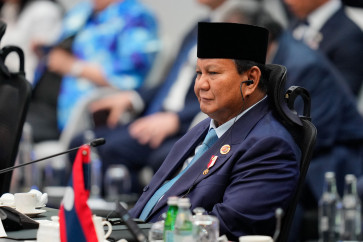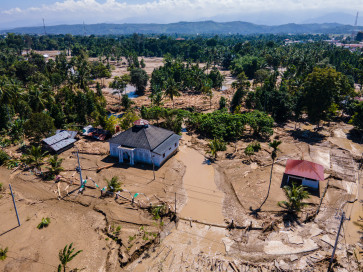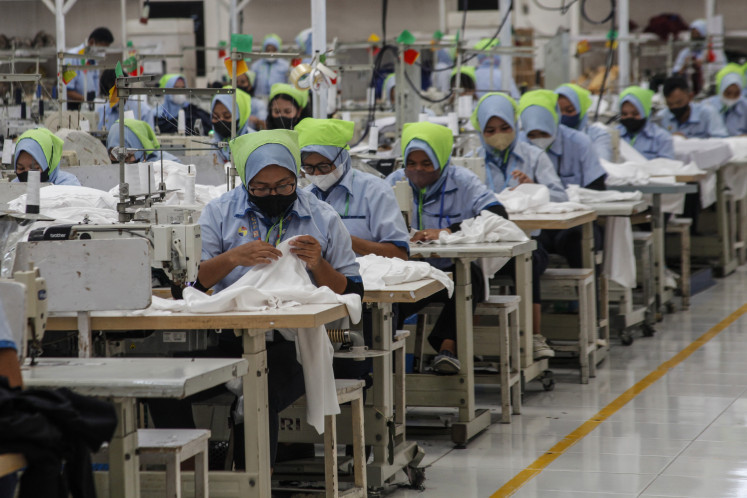Popular Reads
Top Results
Can't find what you're looking for?
View all search resultsPopular Reads
Top Results
Can't find what you're looking for?
View all search resultsIraq eyes $1b trade with RI, seeks exit from visa red list
Iraq, the second-largest oil producer in the oil cartel, the Organization of Petroleum Exporting Countries (OPEC), is aiming to increase its bilateral trade with Indonesia to US$1 billion this year via a recently signed oil sale and purchase agreement and increasing its non-oil and gas imports direct from Jakarta, says a senior Iraqi diplomat
Change text size
Gift Premium Articles
to Anyone
I
raq, the second-largest oil producer in the oil cartel, the Organization of Petroleum Exporting Countries (OPEC), is aiming to increase its bilateral trade with Indonesia to US$1 billion this year via a recently signed oil sale and purchase agreement and increasing its non-oil and gas imports direct from Jakarta, says a senior Iraqi diplomat.
“Both countries signed a memorandum of understanding [MoU] last month during a visit by Coordinating Economic Minister Hatta Rajasa to Iraq.
“Under the agreement, Iraq will supply 35,000 barrels per day [bpd] of oil starting from May 2013. It’s a new beginning,” Iraqi Ambassador to Indonesia Ismieal Shafeeq Muhsin told The Jakarta Post recently.
“Every month, we will export $100 million worth of crude oil to Indonesia. In fact, we offered to supply 65,000 barrels of oil per day. We are now eyeing a billion-dollar trade with Indonesia ”.
According to Indonesia’s Central Statistics Agency (BPS), the value of bilateral trade in 2012 was just $45 million.
According to Ambassador Muhsin, bilateral trade could be far greater still if Indonesia removed Iraq from its immigration red list.
“It’s a big hindrance for Iraqi businesspeople who want to visit Indonesia. We strongly urge Indonesia to remove Iraq from the red list to boost people-to-people contacts and business links,” Muhsin said.
Many countries, including Indonesia, still consider Iraq a dangerous place, and a number of Iraqi citizens illegally enter Indonesian territory each year in their attempts to reach Australia.
Besides oil, Iraq can export fertilizers to Indonesia as Baghdad has strong reserves of phosphate and sulphur, the key ingredients in fertilizer production. At the same time, with its 32 million-strong market and a daily output of 3.7 million bpd of oil as well as over $100 billion in foreign exchange (forex) reserves, Iraq could be a promising market for Indonesian products.
“We need large quantities of furniture, coal, clothing, palm oil, shoes, paper, automobiles, rubber and electronic goods from Indonesia. We are currently getting them through third countries like Jordan and the United Arab Emirates, but we want to import them directly,” Muhsin said.
Iraq, Muhsin said, had been one of the first countries to recognize Indonesia’s independence in 1945. The two countries established diplomatic relations in 1950 and have signed around 15 agreements to boost bilateral ties. In the process of reviving their bilateral relations, which were stalled due to the war in Iraq, Hatta’s visit was important to take the ties to new heights.
During his historic visit to Iraq, Minister Hatta met Iraq’s Deputy Prime Minister for Energy Affairs Hussain al-Shahristani to discuss energy issues.
“During the discussion, Pertamina expressed its interest in buying a stake in the West Qurna 1 oil and gas block. We welcome Pertamina’s intentions. Our government gave its clearance for Pertamina, but it has to negotiate with the current main operator, ExxonMobil Iraq Ltd.,” Muhsin said.
With almost 9 billion barrels of reserves and 2 million bpd output, West Qurna is Iraq’s largest oil and gas block.
Muhsin, who assumed his post in July 2010, has played a key role in reviving the stalled relations between Iraq and Indonesia. At the height of the Iraq War, Indonesia temporarily closed its embassy in Baghdad in 2003.
Thanks to Muhsin’s continual efforts and the gradually improving security situation in Iraq, Indonesia agreed to reopen its embassy in June 2011. Since then, relations between the two countries have developed at a fast pace. Last October, a 75-strong trade delegation visited Indonesia to explore business opportunities.










